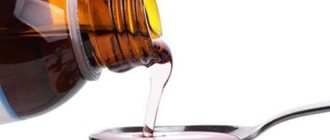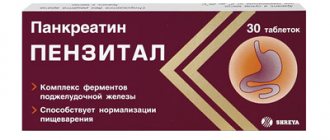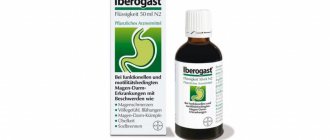Release form, packaging and composition of the drug Clinical-pharmacological group Pharmaco-therapeutic group Pharmacological action Indications for use Method of administration and doses Side effects Contraindications for use Use in children Special instructions Drug interactions
Registration Certificate Holder:
CTS Chemical Industries, Ltd. (Israel)
ATX Code:
G04BD04
Active substance:
oxybutynin
Dosage form:
Novitropan
| The drug is available with a prescription | Novitropan | Tablets reg. No.: P N014574/01 dated 11/10/09 - Indefinitely |
pharmachologic effect
M-anticholinergic blocker from the group of tertiary amines. Along with moderate m-anticholinergic activity, it has the ability to directly affect the smooth muscles of internal organs (myotropic antispasmodic effect). Eliminates spasms and reduces the tone of smooth muscles of internal organs: gastrointestinal tract, biliary tract, uterus, urinary tract, incl. Bladder. In neurogenic bladder, oxybutynin relaxes the bladder detrusor, reduces spontaneous detrusor contractions, increases bladder capacity, and reduces the frequency of the urge to urinate.
Directions for use and doses
The method of administration and dosage regimen of a particular drug depend on its release form and other factors. The optimal dosage regimen is determined by the doctor. The compliance of the dosage form of a particular drug with the indications for use and dosage regimen should be strictly observed.
Taken orally. Adults - 5 mg 2-3 times a day. In elderly patients, at the beginning of treatment, use 2.5-3 mg 2 times / day, then, if necessary, gradually increase the dose to 5 mg 2 times / day.
Children over 5 years old - initial dose 2.5-3 mg 2 times / day, if necessary, gradually increase the dose to 5 mg 2-3 times / day. For nocturnal enuresis, the last dose should be taken immediately before bedtime.
Novitropan instructions for use
Instructions for medical use of the drug Novitropan
Release form: Novitropan - 5 mg tablets. 10 tablets in a blister pack. 2 contour packages along with instructions for use per pack.
Composition: 1 tablet Novitropan contains: active substance: oxybutynin chloride - 5.0 mg; auxiliary components: lactose monohydrate, corn starch, povidone, magnesium stearate, calcium carboxymethylcellulose, indigo carmine (E 132).
The drug Novitropan is an antispasmodic agent that eliminates spasms and reduces the tone of smooth muscles: the gastrointestinal tract, biliary tract, uterus, relaxes the detrusor (direct spasmomyolytic and m-anticholinergic effects). Increases bladder capacity, reduces the frequency of detrusor contractions, and inhibits the urge to urinate. Pharmacokinetics Maximum concentration of the active substance in plasma 1 hour after oral administration of the drug. Bioavailability is 6%, due to first-pass metabolism. The half-life is approximately 2 hours. Penetrates the blood-brain barrier. Found in mother's breast milk.
Indications for use: Novitropan is used for urinary incontinence associated with instability of bladder function, impaired as a result of disorders of a neurogenic nature (hyperreflex of the detrusor (muscle that contracts the bladder)), for example, with widespread sclerosis or spina bifida, or with idiopathic disorders of detrusor function ( motor incontinence). In addition, in children over 5 years of age, oxybutynin can be used for nocturnal enuresis in combination with non-drug therapy or in combination with other drugs when previous therapy has not been effective.
Directions for use: Novitropan tablets should be taken orally, before meals. Children under 5 years of age: not recommended. Children over 5 years: Neurogenic bladder disorders: The usual dose is 5 mg twice daily. This dose may be increased by a maximum of 5 mg three times daily to achieve therapeutic effect, provided there are no side effects. Nocturnal enuresis: The usual dose is 5 mg two or three times daily. The last dose should be given before bedtime. In children, maintenance dosage can be achieved by ascending titration starting at 2.5 mg twice daily. Adults: The usual dose is 5 mg two or three times daily. This dose may be increased to a maximum dosage of 5 mg four times daily (20 mg) to obtain a satisfactory clinical response, provided there are no side effects. Elderly patients: The half-life may be prolonged in some elderly patients, therefore, dosage should be titrated individually, starting with 2.5 mg twice daily. Final dosage will depend on response and tolerance of side effects. General precautions should be observed when administering anticholinergic drugs to debilitated and elderly patients.
Side effects: The use of Novitropan tablets can cause the following side effects: dry mouth, dyspepsia (nausea, vomiting, constipation, flatulence), urinary disorders (including urinary retention), decreased gastric and intestinal motility, drowsiness or insomnia, weakness , dizziness, anxiety, hallucinations, tachycardia, decreased production of tear fluid, visual impairment (mydriasis, accommodation paralysis, amblyopia), increased intraocular pressure, decreased sweating, decreased potency, suppressed lactation, allergic reactions.
Contraindications: Contraindications to the use of the drug Novitropan are: hypersensitivity, open- and closed-angle glaucoma, gastrointestinal obstruction, paralytic ileus, intestinal atony, dilation of the colon (including toxic, complicated by ulcerative colitis), ulcerative colitis, myasthenia gravis , obstructive uropathy, bleeding, childhood (up to 5 years), pregnancy, lactation. Carefully. Renal/liver failure, thyrotoxicosis, coronary heart disease, chronic heart failure, arrhythmias, arterial hypertension, prostatic hyperplasia, hiatal hernia, diarrhea accompanying incomplete intestinal obstruction (especially in patients with ileo- or colostomy), old age.
Pregnancy: The safety of using Novitropan during pregnancy has not been established. Nursing mothers should use with caution.
Interaction with other drugs: Novitropan should be used with caution in combination with lisuride, because there is a risk of developing symptoms of confusion. Regular medical supervision is recommended. When used together with atropine and its derivatives, antidepressants of the imipramine group, sedative antihistamine Hi-receptor blockers, antispasmodics with atrapine-like action, other anticholinergic and antiparkinsonian drugs, disopyramide, phenothiazine neuroleptics, it is possible to enhance undesirable M-anticholinergic effects: impaired accommodation, dryness in the mouth, tachycardia, urinary retention, constipation. Ethanol and sedative drugs increase dizziness and drowsiness.
Overdose: Symptoms of Novitropan overdose: stimulation of the central nervous system (anxiety, tremor, irritability, convulsions, delirium, hallucinations), fever, nausea, vomiting, tachycardia, decreased or increased blood pressure, respiratory failure, paralysis, coma. Treatment: immediately seek medical help, gastric lavage, prescribe activated charcoal and a saline laxative, maintain breathing; To reduce the severity of symptoms of anticholinergic intoxication, anticholinesterase drugs (physostigmine) are used. For hyperpyrexia - cold compresses (including ice), alcohol rubdowns.
Storage conditions: In a place protected from moisture at a temperature not exceeding 25°C. Keep out of the reach of children.
Additionally: During treatment with Novitropan, it is not recommended to drive vehicles or engage in other potentially hazardous activities that require increased concentration and speed of psychomotor reactions. During treatment with the drug, the use of alcohol should be avoided. It must be borne in mind that high ambient temperatures more often provoke the occurrence of fever (decreased sweating) and cardiac weakness while taking the drug.
special instructions
Use with caution in elderly patients, with NCD, impaired liver or kidney function, thyrotoxicosis, arrhythmia, ischemic heart disease, chronic heart failure, arterial hypertension, initial manifestations of benign prostatic hyperplasia, UC, in patients with ileostomy, colostomy, and hiatal hernia openings of the diaphragm, accompanied by reflux esophagitis. Impact on the ability to drive vehicles and operate machinery
Use with caution in patients whose activities require increased concentration and high speed of psychomotor reactions.
Novitropan tablet 5 mg in container pack No. 10x2
Name
Novitropan tablet 5 mg in container pack No. 10x2
Description
The tablets are light blue in color, round, biconvex, with a score on one side, inclusions are possible.
Main active ingredient
Oxybutynin
Release form
Pills
Dosage
5mg
pharmachologic effect
Antispasmodic, eliminates spasms and reduces the tone of smooth muscles of the gastrointestinal tract, biliary tract, uterus, relaxes the detrusor (direct spasmomyolytic and m-anticholinergic effect). Increases bladder capacity, reduces the frequency of detrusor contractions, and inhibits the urge to urinate.
Indications for use
Novitropan is used for urinary incontinence associated with instability of bladder function, impaired as a result of disorders of a neurogenic nature (hyperreflex of the detrusor (muscle that contracts the bladder)), for example, with widespread sclerosis or spina bifida, or with idiopathic disorders of detrusor function (motor incontinence) . In addition, in children over 5 years of age, oxybutynin can be used for nocturnal enuresis in combination with non-drug therapy or in combination with other drugs when previous therapy has been ineffective.
Directions for use and doses
Inside, before meals. Adults: The usual dose is 5 mg two or three times daily. This dose may be increased to a maximum dosage of 5 mg four times daily (20 mg) to achieve clinical response, provided there are no side effects. Elderly patients: The half-life may be prolonged in the elderly, so dosage should be titrated individually, starting with 2.5 mg twice daily. Final dosage will depend on response and tolerance of side effects. Children (under 5 years): Not recommended. Children (over 5 years): Neurogenic bladder disorders: The usual dose is 2.5 mg twice daily. This dose may be increased to 5 mg two or three times daily to achieve therapeutic effect, provided there are no side effects. Nocturnal enuresis: The usual dose is 2.5 mg twice daily. This dose may be increased to 5 mg two or three times daily to obtain clinical response; side effects are tolerated. The last dose should be given before bedtime. The tablet of the drug Novitropan is not divided and is not intended for titration. If it is necessary to use Novitropan in a dose of less than 5 mg, it is recommended to use a drug from another manufacturer that provides the possibility of such a dosage. If you forget to take a medicine, do not take a double dose to make up for the missed dose! Do not stop taking Novitropan without first consulting your doctor!
Use during pregnancy and lactation
If you are pregnant or breastfeeding, think you may be pregnant, or think you may be pregnant, tell your doctor. Use during pregnancy and lactation is contraindicated.
Impact on the ability to drive vehicles and other potentially dangerous mechanisms
During the treatment period, it is not recommended to drive vehicles or engage in other potentially hazardous activities that require increased concentration and speed of psychomotor reactions.
Precautionary measures
Oxybutynin should be used with caution in frail elderly people and children, who may be more sensitive to the effects of the drug, and in patients with autonomic neuropathy (eg, Parkinson's disease), severe gastrointestinal motility disorders, liver or kidney failure. Anticholinergics should be used with caution in elderly patients due to the risk of cognitive impairment. Gastrointestinal diseases: Anticholinergic drugs may impair gastrointestinal motility, which should be considered when treating patients with gastrointestinal obstructive disorders, intestinal atony and ulcerative colitis. Oxybutynin may increase tachycardia (caution should be exercised in the case of hyperthyroidism, congestive heart failure, cardiac arrhythmia, coronary artery disease, hypertension), cognitive impairment and symptoms of prostatic hypertrophy. CNS adverse reactions (eg, hallucinations, agitation, confusion, drowsiness) have been reported with the use of anticholinergic drugs. In the first few months after starting therapy or when increasing the dose, monitoring the patient's condition is recommended. If such complications develop, it is necessary to consider discontinuing therapy or reducing the dose. Taking oxybutynin can lead to angle-closure glaucoma. Patients should be advised to consult a doctor immediately if there is sudden loss of visual acuity or eye pain. Oxybutynin may reduce salivary gland secretions, which may contribute to the development of dental caries, periodontal disease, or oral candidiasis. Anticholinergic drugs should be used with caution in patients who have a hiatal hernia, gastroesophageal reflux disease, and/or who are concomitantly taking medications (eg, bisphosphonates) that may cause or worsen esophagitis. The use of oxybutynin in high ambient temperatures may lead to the development of fever due to decreased sweating. Children: The use of oxybutynin in children under 5 years of age is not recommended. There is limited evidence to support the use of oxybutynin in children with nocturnal monosymptomatic enuresis (not associated with detrusor overactivity). Oxybutynin should be used with caution in children over 5 years of age, as they may be more sensitive to the effects of the drug (for example, adverse reactions from the central nervous system). The drug contains lactose, and therefore it is not recommended for use in patients with rare congenital galactose intolerance, Lapp lactase deficiency and glucose-galactose malabsorption.
Interaction with other drugs
If you are currently or have recently taken other medications, tell your doctor. The anticholinergic effects of oxybutynin are increased when used simultaneously with other anticholinergic drugs or with anticholinergic drugs (for example, amantadine and other antiparkinsonian drugs: biperiden, levodopa), with antihistamines, antipsychotics (for example, phenothiazines and butyrophenones), quinidine, digitalis drugs, tricyclics antidepressants, atropine and atropine-like antispasmodics, dipyridamole. If gastric motility decreases, oxybutynin may affect the absorption of other drugs. Oxybutynin is metabolized by cytochrome P450 (CYP3A4 isoenzyme). Concomitant use with CYP3A4 inhibitors may slow down the metabolism of oxybutynin and increase plasma concentrations of oxybutynin. Concomitant use with cholinesterase inhibitors may reduce the effectiveness of the cholinesterase inhibitor. Patients should be informed that alcohol may increase drowsiness caused by anticholinergic drugs such as oxybutynin. During treatment with Novitropan, the use of alcohol should be avoided.
Contraindications
Hypersensitivity, open- and closed-angle glaucoma, obstruction of the gastrointestinal tract, paralytic ileus, intestinal atony, dilatation of the colon (including toxic, complicated by ulcerative colitis), ulcerative colitis, myasthenia gravis, obstructive uropathy, bleeding, childhood ( up to 5 years), pregnancy, lactation period. Carefully. Renal/liver failure, thyrotoxicosis, coronary heart disease, chronic heart failure, arrhythmias, arterial hypertension, prostatic hyperplasia, hiatal hernia, diarrhea accompanying incomplete intestinal obstruction (especially in patients with ileo- or colostomy), old age.
Compound
Each tablet contains: active substance: oxybutynin chloride - 5.0 mg; auxiliary components: lactose monohydrate, corn starch, povidone, magnesium stearate, calcium carboxymethylcellulose, indigo carmine (E 132).
Overdose
Symptoms: excitement of the central nervous system (anxiety, tremor, irritability, convulsions, delirium, hallucinations), fever, nausea, vomiting, tachycardia, decreased or increased blood pressure, respiratory failure, paralysis, coma. Treatment: immediately seek medical help, gastric lavage, prescribe activated charcoal and a saline laxative, maintain breathing; To reduce the severity of symptoms of anticholinergic intoxication, anticholinesterase drugs (physostigmine) are used. For hyperpyrexia - cold compresses (including ice), alcohol rubdowns.
Side effect
The assessment of undesirable side reactions is based on the following data on the frequency of occurrence: very often (? 1/10); often (? 1/100 to
Storage conditions
In a place protected from moisture at a temperature not exceeding 25°C. Keep out of the reach of children.



